|
COVID-19 Emergency Response Information
Stay Safer at Home. Stay Healthy.
COVID-19 Emergency Response Information at
AUCD's National Center on Disability in Public Health
Public Health is for Everyone Toolkit Updates: COVID-19 Resources!
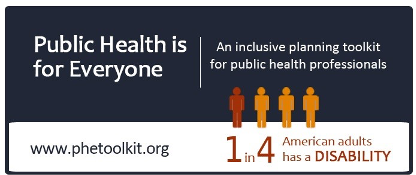 The Public Health is for Everyone Toolkit is a one-stop collection of resources on health and disability. The online toolkit serves to increase the capacity of public health professionals to create programs that benefit entire communities, including people who have disabilities. The Public Health is for Everyone Toolkit provides resources to enhance planning efforts in key issue areas such as emergency preparedness, nutrition, obesity, health care access, accessibility, and more. The Public Health is for Everyone Toolkit is a one-stop collection of resources on health and disability. The online toolkit serves to increase the capacity of public health professionals to create programs that benefit entire communities, including people who have disabilities. The Public Health is for Everyone Toolkit provides resources to enhance planning efforts in key issue areas such as emergency preparedness, nutrition, obesity, health care access, accessibility, and more.
Visit the COVID-19 issue area of the PHEtoolkit.org to see all the newly added resources for current information and strategies for support and coping with social distancing! You can also submit resources to be included in the toolkit here!
AUCD News & Events
AUCD's #sleeveup Launches Tuesdays with Liz Contest
Deadline: July 16, 2021
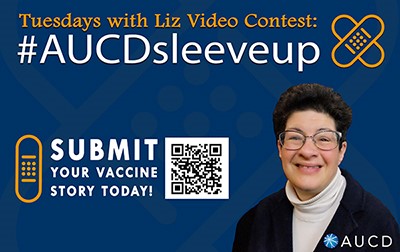
AUCD is excited to announce the new #AUCDsleeveup Tuesdays with Liz Contest! AUCD is looking for short videos from persons with disabilities, their family members, and other friends of the disability community sharing why you got the COVID-19 vaccine! Videos will be posted to AUCD social media and available for you and others to share with your own social media. The top 3 videos with the most likes, comments, and shares on social media will *win* AUCD gear and the person with the top video will also win an interview on a Tuesdays with Liz episode!
Submit your #AUCDsleeveup vaccine story today!
AUCD Announces NEW Prepared4ALL: Whole Community Inclusive Emergency Planning!
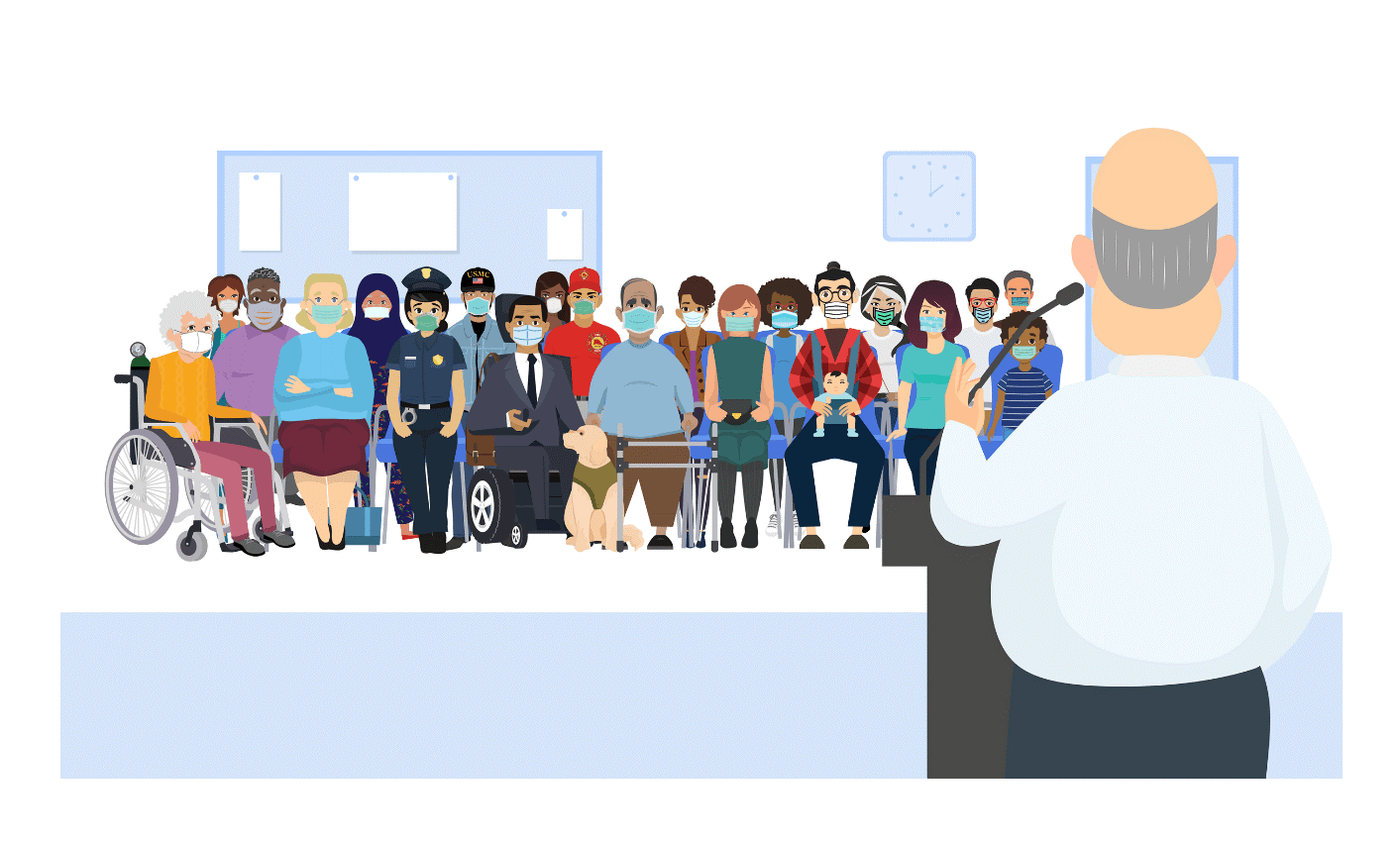
Together with its partners, the Association of University Centers on Disabilities (AUCD) is launching a new initiative, Prepared4ALL, mobilizes disability organizations and their local networks to get a seat at the emergency planning table. COVID-19 impacts all communities across the US - including the over 61 million Americans who have disabilities. Approximately 1 in 4 Americans have a disability, yet state and local preparedness planning, mitigation and recovery efforts do not consistently include them.
"Our work is to help partners identify opportunities for disability inclusion in local emergency planning and show how to take action," says Dr. Adriane Griffen, AUCD's Senior Director of Public Health and Leadership. "Our unique Prepared4ALL evidence-based approach helps build relationships between local disability organizations and public health planners and emergency managers."
Prepared4All addresses gaps in emergency planning by sharing insights on how to make efforts accessible for people with disabilities through three related strategies:
- Prepared4ALL: Whole Community Inclusive Emergency Planning - A new, free online training on the basics of the American Emergency Management System, the Americans with Disabilities Act, and whole community planning.
- Prepared4ALL Disability Inclusion Coach program to help AUCD trainees form local networks between local disability organizations in the community, local emergency management, and public health professionals.
- Prepared4All Town Halls which link local chapters of disability organizations and make introductions to local public health planners and emergency managers to troubleshoot and discuss solutions.
Learn more about the Prepared 4ALL Emergency planning and disability inclusion in the emergency management system.
Access to Healthcare
Better Preventive Health Needed for Adults with IDD
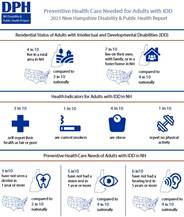 Compared to adults with intellectual and developmental disabilities (IDD) nationally, adults with IDD in New Hampshire (NH) are more likely to live in a rural area. In NH, many adults with IDD need support to get preventive health care and engage in healthy behaviors. Preventive health care includes regular visits with a provider to screen for health issues and share health information. Compared to adults with intellectual and developmental disabilities (IDD) nationally, adults with IDD in New Hampshire (NH) are more likely to live in a rural area. In NH, many adults with IDD need support to get preventive health care and engage in healthy behaviors. Preventive health care includes regular visits with a provider to screen for health issues and share health information.
The New Hampshire (NH) Disability & Public Health project's 2021 infographic report shows that adults with intellectual and developmental disabilities (IDD) in NH need better access to preventive health care.
Learn more about the residential status and health needs of adults with IDD and find strategies to improve preventive health care for people with IDD in NH.
Improving Access to Care for People with Disabilities
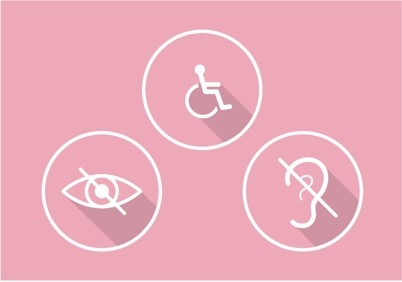 The Centers for Medicare and Medicaid Services (CMS), Office of Minority Health works to ensure that people with disabilities receive equal access to quality health care information and services. Use this page to find tools and resources that can help you improve services and help patients understand their rights. This resource page offers data highlights, issue briefs, and videos for navigating healthcare with a disability. The Centers for Medicare and Medicaid Services (CMS), Office of Minority Health works to ensure that people with disabilities receive equal access to quality health care information and services. Use this page to find tools and resources that can help you improve services and help patients understand their rights. This resource page offers data highlights, issue briefs, and videos for navigating healthcare with a disability.
Learn more about CMS and view their support page for helpful resources for individuals with disabilities and healthcare access.
Equity Must be Baked into Expansion of Telehealth
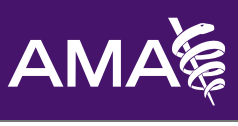 The American Medical Association (AMA) approved policy intended to help close the digital divide in access to telehealth services. The new policy will help ensure that minority communities, individuals residing in underserved rural and urban areas, older adults, and individuals with disabilities can reap the benefits and promise of telehealth. The American Medical Association (AMA) approved policy intended to help close the digital divide in access to telehealth services. The new policy will help ensure that minority communities, individuals residing in underserved rural and urban areas, older adults, and individuals with disabilities can reap the benefits and promise of telehealth.
At the Special Meeting of the AMA House of Delegates, physicians, residents, and medical students adopted policy to promote initiatives to strengthen digital literacy, emphasizing programs designed with and for historically minoritized and marginalized populations. The AMA believes that telehealth solutions and service providers-in their design and implementation efforts-need to work directly with the populations their products are meant to help and serve. Culture, language, accessibility and digital literacy must be considered when designing telehealth functionality and content. Read the full article and learn more about policies for equitable telehealth.
Developmental Monitoring
New! "Learn the signs. Act Early." Digital Toolkit
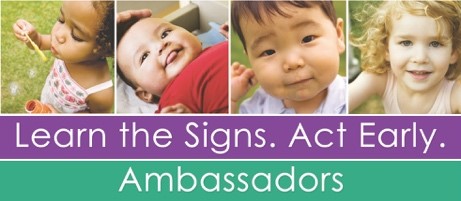 The Centers for Disease Control and Prevention (CDC) are excited to announce the availability of a new Digital Toolkit! This toolkit provides a brief snapshot of some of the most popular LTSAE materials and resources, including CDC's Milestone Tracker App, Milestone Checklists, Developmental Monitoring and Screening fact sheets, Information for Families, Early Intervention Information by State, and more. The Centers for Disease Control and Prevention (CDC) are excited to announce the availability of a new Digital Toolkit! This toolkit provides a brief snapshot of some of the most popular LTSAE materials and resources, including CDC's Milestone Tracker App, Milestone Checklists, Developmental Monitoring and Screening fact sheets, Information for Families, Early Intervention Information by State, and more.
Learn more about Learn the Signs. Act Early, and the Act Early Network.
Virtual Education & Students With Disabilities Resource Guide: Supporting Student Success in the Time of COVID-19 and Beyond
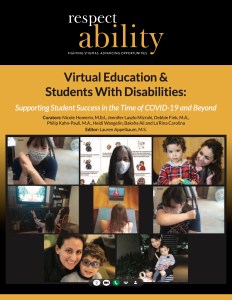 Whether you are a student with a disability or an adult (parent, guardian, teacher or otherwise) who is championing success for a student with a disability, this guide is for you. Respectability created the Virtual Education and Students With Disabilities Guide with a goal to be a timesaver for students with disabilities, as well as for the adults in their lives who care about them. This guide includes resources that can help pave the best educational and social-emotional path possible during this pandemic. Whether you are a student with a disability or an adult (parent, guardian, teacher or otherwise) who is championing success for a student with a disability, this guide is for you. Respectability created the Virtual Education and Students With Disabilities Guide with a goal to be a timesaver for students with disabilities, as well as for the adults in their lives who care about them. This guide includes resources that can help pave the best educational and social-emotional path possible during this pandemic.
Learn more information about Respectability and Download the PDF or accessible Word document of this resource guide for resources for students with disabilities.
Outreach Projects Help Vulnerable Families Catch Up On Health After Pandemic
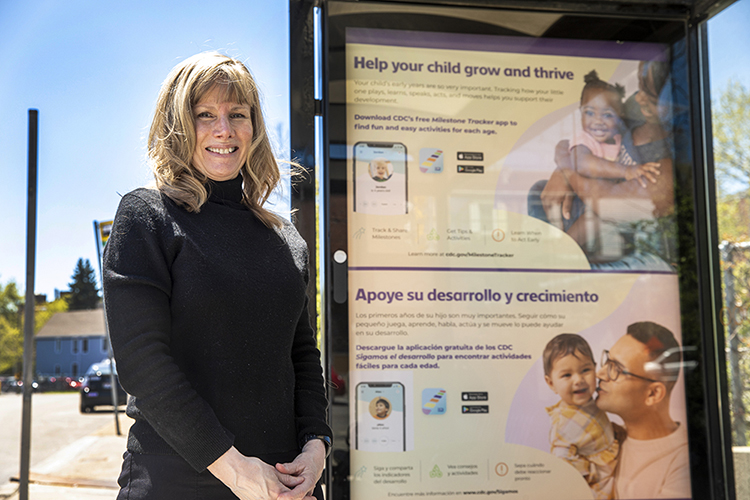 An educational campaign in Milwaukee is reaching out to low-income families with young children who may have put off doctor's appointments during the COVID-19 pandemic and are under considerable stress from long-term isolation. Kris Barnekow, associate professor of health sciences, is leading the two outreach projects in Milwaukee with funding from the Centers for Disease Control and Prevention (CDC). "Since the pandemic, many parents stopped seeing their pediatricians and children weren't going to daycare," Barnekow said. "And parents had their children at home, which increased their stress levels." The funding supports the twin goals of encouraging parents to monitor their infant and toddlers' developmental milestones with the CDC's "Learn the Signs. Act Early" materials and giving families resources to weather difficult times. An educational campaign in Milwaukee is reaching out to low-income families with young children who may have put off doctor's appointments during the COVID-19 pandemic and are under considerable stress from long-term isolation. Kris Barnekow, associate professor of health sciences, is leading the two outreach projects in Milwaukee with funding from the Centers for Disease Control and Prevention (CDC). "Since the pandemic, many parents stopped seeing their pediatricians and children weren't going to daycare," Barnekow said. "And parents had their children at home, which increased their stress levels." The funding supports the twin goals of encouraging parents to monitor their infant and toddlers' developmental milestones with the CDC's "Learn the Signs. Act Early" materials and giving families resources to weather difficult times.
Read the full article and learn more about the Act Early Response to COVID-19.
Emergency Preparedness
Latest Public Health and Research Information about COVID-19
 Research on COVID-19 is an emerging and rapidly evolving situation. The National Institute of Health (NIH) is doing everything to get toward the development of diagnostics, therapeutics, and vaccines. You can find the latest public health information from the Centers for Disease Control and Prevention (CDC) and the latest research information from NIH. Research on COVID-19 is an emerging and rapidly evolving situation. The National Institute of Health (NIH) is doing everything to get toward the development of diagnostics, therapeutics, and vaccines. You can find the latest public health information from the Centers for Disease Control and Prevention (CDC) and the latest research information from NIH.
HHS Launches Hotline to Improve Access to COVID-19 Vaccines for People with Disabilities
 Health and Human Services (HHS) announces the launch of a first-of-its-kind national hotline to connect people with disabilities to information and services to improve access to COVID-19 vaccines. Health and Human Services (HHS) announces the launch of a first-of-its-kind national hotline to connect people with disabilities to information and services to improve access to COVID-19 vaccines.
The Disability Information and Access line (DIAL) is now available to help people with disabilities find vaccination locations in their communities, assist callers with making vaccination appointments, and connect callers to local services - such as accessible transportation - to overcome barriers to vaccination. The hotline also can also provide information and resources to answer questions and address concerns about the vaccines and can connect callers to information and services that promote independent living and address fundamental needs, such as food, housing, and transportation. Read the full article and learn more about how the Administration for Community Living was able to launch this resource in less than six weeks.
Protecting the Vulnerable: How Public Health Can Better Serve People with Disabilities
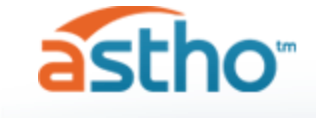 The Association of State and Territorial Health Official's (ASTHO) Public Health Review discusses relevant issues with voices from today's public health experts. People living with disabilities have borne disproportionate burden in past emergency situations due to inequities in preparedness and response. To address and prevent inequities in the COVID-19 response, ASTHO placed 14 disability and preparedness specialists into health agencies around the country to promote inclusivity of people living with disabilities. The Association of State and Territorial Health Official's (ASTHO) Public Health Review discusses relevant issues with voices from today's public health experts. People living with disabilities have borne disproportionate burden in past emergency situations due to inequities in preparedness and response. To address and prevent inequities in the COVID-19 response, ASTHO placed 14 disability and preparedness specialists into health agencies around the country to promote inclusivity of people living with disabilities.
On this episode, guest speakers (Sara Hart Weir, MS, Special Advisor, Missouri Department of Health & Senior Services, Kara Nett Hinkley, MPP; Special Advisor for COVID-19, Louisiana Department of Health, ad Joseph Kanter, MD, MPH, State Health Officer, Louisiana Department of Health) explore ways that two of these disability and preparedness specialists have worked to address the needs of people living with disabilities in their jurisdictions. Our experts share their drive for this work and what their states are doing to promote equity for people living with disabilities. Listen to the full podcast to learn more about ASTHO Experts and how public health officials can better serve individuals with disabilities.
Website Accessibility: Enhancing Access to COVID-19 Vaccine Registration and Beyond
 For many individuals living with disabilities, inaccessible vaccination websites have been a significant barrier to receiving the COVID-19 vaccine. Recent studies have found that many vaccination websites do not reliably meet accessibility standards. This brief discusses how several disability rights laws apply to COVID-19 vaccine registration websites and offers considerations for state and territorial health agencies as they work to improve website accessibility for people living with disabilities. For many individuals living with disabilities, inaccessible vaccination websites have been a significant barrier to receiving the COVID-19 vaccine. Recent studies have found that many vaccination websites do not reliably meet accessibility standards. This brief discusses how several disability rights laws apply to COVID-19 vaccine registration websites and offers considerations for state and territorial health agencies as they work to improve website accessibility for people living with disabilities.
To connect with the disability and preparedness specialists to learn more about their work and opportunities for partnership, please email [email protected].
Nutrition and Healthy Weight
Move United Confronts Ignorance and Fuels Conversations Around Equity and Inclusion in Sport
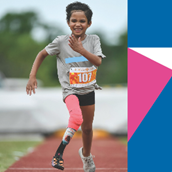 For the second year in a row, Move United Education delivered its annual conference virtually. Reaching over 900+ professionals from over 500+ organizations, Move United expanded its conference in terms of scope and topics, organization resources and digital resources for attendees. Together, they covered pivotal conversations around equity and inclusion in the adaptive sport community. View Move United Education Conference's highest attended session, Athletes, Ableism, & Advocacy: Centering Disability Identities, Rights & Justice. For the second year in a row, Move United Education delivered its annual conference virtually. Reaching over 900+ professionals from over 500+ organizations, Move United expanded its conference in terms of scope and topics, organization resources and digital resources for attendees. Together, they covered pivotal conversations around equity and inclusion in the adaptive sport community. View Move United Education Conference's highest attended session, Athletes, Ableism, & Advocacy: Centering Disability Identities, Rights & Justice.
Integrating Universal Design into the Healthy for Life® Program: An Inclusive Health Promotion Initiative
 The Healthy for Life community nutrition program is an evidence-based community nutrition and well-being program that empowers people to make healthy food, nutrition and lifestyle choices. The initiative was created by Aramark and the American Heart Association to change food and health attitudes and behaviors, equipping individuals with new skills for healthy living using science-based resources. The Healthy for Life community nutrition program is an evidence-based community nutrition and well-being program that empowers people to make healthy food, nutrition and lifestyle choices. The initiative was created by Aramark and the American Heart Association to change food and health attitudes and behaviors, equipping individuals with new skills for healthy living using science-based resources.
The Kentucky Inclusive Health Collaborative at the University of Kentucky's Human Development Institute collaborated with Aramark and the American Heart Association to apply Universal Design principles to many of the Healthy for Life educational experiences. PowerPoints, picture recipes, and supplemental handouts were created to be inclusive and accessible to the broadest audience including individuals with disabilities.
The Healthy for Life community nutrition program helps individuals discover, choose and prepare healthy foods. Learn more about the Universally Designed resources and the full Healthy for Life® program.
Sexual and Reproductive Health
Now Archived! The 9 Part Sex Talk for Self-Advocates Webinar Series
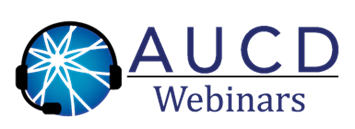 AUCD's The Sex Talk for Self-Advocates Webinar series is a 9-part webinar series that addresses self-advocate questions about relationships and sexuality. This series is a great learning opportunity for self-advocates, professionals, and paraprofessionals working with individuals with intellectual and developmental disabilities to understand sexual health needs better. In this series, you will hear from our expert hosts of sexuality educators and self-advocates. Check out the Sex Talk for Self-Advocates Webinar Series and for more information view AUCD's Sexual Health SIG webpage. AUCD's The Sex Talk for Self-Advocates Webinar series is a 9-part webinar series that addresses self-advocate questions about relationships and sexuality. This series is a great learning opportunity for self-advocates, professionals, and paraprofessionals working with individuals with intellectual and developmental disabilities to understand sexual health needs better. In this series, you will hear from our expert hosts of sexuality educators and self-advocates. Check out the Sex Talk for Self-Advocates Webinar Series and for more information view AUCD's Sexual Health SIG webpage.
A Prelude to Consent: Believing it's YOUR Life and Knowing When to Say No, AND Yes
 "Focusing on teaching people to say no almost implies that it's more important to say no than to say yes. It is important that everyone knows what they want to say yes to and no to and have the skills to carry out their decisions. "Focusing on teaching people to say no almost implies that it's more important to say no than to say yes. It is important that everyone knows what they want to say yes to and no to and have the skills to carry out their decisions.
When teaching people with intellectual or developmental disabilities (I/DD), or anyone, how to say yes or no, to give consent or not, you first have to find out if the person knows and believes it is their life to make decisions about. If the person doesn't believe this all the skills and definitions will not make a difference in their ability to consent, to say yes or no. Learn more about Elevatus Training and the importance of consent for individuals with I/DD.
Wellness and Mental Health
How Physical Disabilities and Mental Health Intersect
 " There is a significant body of evidence that persons with disabilities are at an increased risk for suicide or suicidal ideation. However, the evidence also shows that it is not the disabling condition per se that most often leads to suicidal impulses. " There is a significant body of evidence that persons with disabilities are at an increased risk for suicide or suicidal ideation. However, the evidence also shows that it is not the disabling condition per se that most often leads to suicidal impulses.
Rather, it's the social constraints that so many people with disabilities regularly face that can lead to life-threatening depression. Research shows, for example, people with disabilities encounter tremendous obstacles to "normal" social functioning that have little or nothing to do with the injury or illness itself. This includes barriers that are both structural and ideological, from limited access to public transportation or curbside cutouts for wheelchair-users to the lack of flexible work options for persons who might need it."
Continue reading this article to learn more about the intersection of disability and mental health and check out additional resources from Abilities.
Other Resources
World Sickle Cell Day
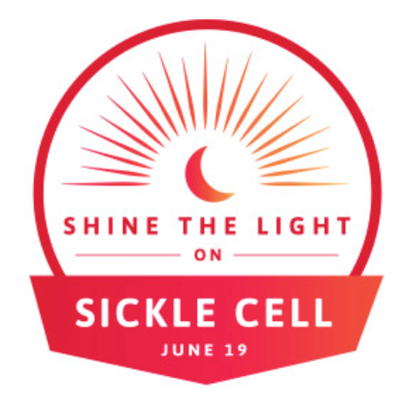 World Sickle Cell Day was on June 19. Each year, people across the globe shine the light on sickle cell disease (SCD). Communities around the nation planned a variety of activities for this event, including awareness campaigns, blood drives and more. Together, communities must and will find a universal cure for SCD! Learn more about Shine the Light and get involved today! World Sickle Cell Day was on June 19. Each year, people across the globe shine the light on sickle cell disease (SCD). Communities around the nation planned a variety of activities for this event, including awareness campaigns, blood drives and more. Together, communities must and will find a universal cure for SCD! Learn more about Shine the Light and get involved today!
L.I.V.E: Live Inclusive Virtual Events and Programs
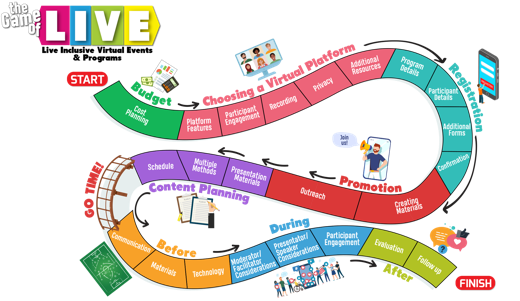 The The Game of L.I.V.E (Live Inclusive Virtual Events & Programs) is a comprehensive virtual accessibility resource that uses an easy-to-follow gameboard format and provides concise information on how to create a maximally inclusive and accessible virtual program. This resource provides information on creating accessible and inclusive programs. Successful programming begins with preparation. Identifying and planning for potential barriers to participation will move you closer to the goal of a virtual program that meets the needs of everyone. The The Game of L.I.V.E (Live Inclusive Virtual Events & Programs) is a comprehensive virtual accessibility resource that uses an easy-to-follow gameboard format and provides concise information on how to create a maximally inclusive and accessible virtual program. This resource provides information on creating accessible and inclusive programs. Successful programming begins with preparation. Identifying and planning for potential barriers to participation will move you closer to the goal of a virtual program that meets the needs of everyone.
This resource was developed in collaboration between the Kentucky Inclusive Health Collaborative at the University of Kentucky's Human Development Institute and the New York State Department of Health, Disability and Health Program. Learn more about this resource and try out the Game of L.I.V.E. today!
Virtual Disability Pride Parade
July 26th via Twitter, Instagram, and Facebook
 Make a statement and join Easterseals for their virtual disability pride parade on the anniversary of the Americans with Disabilities Act! To join, use the hashtag #VirtualDisabilityParade on July 26th. Create a virtual 'sign' that shows your pride and share with everyone using the hashtag on Facebook, Twitter, and Instagram. Easterseals will feature your signs throughout the day! Visit Easterseals page to learn more about the virtual parade and find virtual signs to show your pride on July 26th! Make a statement and join Easterseals for their virtual disability pride parade on the anniversary of the Americans with Disabilities Act! To join, use the hashtag #VirtualDisabilityParade on July 26th. Create a virtual 'sign' that shows your pride and share with everyone using the hashtag on Facebook, Twitter, and Instagram. Easterseals will feature your signs throughout the day! Visit Easterseals page to learn more about the virtual parade and find virtual signs to show your pride on July 26th!
|


